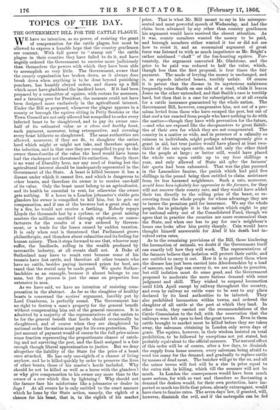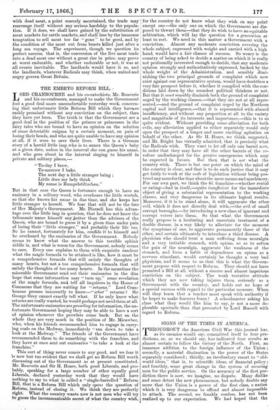TOPICS OF THE DAY.
THE GOVERNMENT BILL FOR THE CATTLE PLAGUE.
WE have no intention, as no power, of resisting the grant of compensation for the cattle plague, but must be allowed to express a humble hope that the country gentlemen are content. With full power to " stamp out " the cattle plague in their counties they have failed to do it, and have angrily ordered the Government to exercise more judiciously than themselves the powers with which they have been able to accomplish so very little. The Government, aware that the county organization has broken down, as it always does break down when anything is to be done beyond punishing poachers, has humbly obeyed orders, and drawn up a Bill which must have gladdened the landlord heart. If it had been prepared by a committee of squires, with rectors for assessors, and a fanning peer for President, the measure could not have been designed more exclusively in the agricultural interest. Under the Bill as proposed, whenever the plague appears in a county or borough the squires sitting in Petty Sessions or the Town Council are not only allowed but compelled to order every infected beast to be slaughtered, and to pay its owner one- half of its estimated value as a clean and healthy beast, such payment, moreover, being retrospective, and covering every beast hitherto so slaughtered. The same authorities are allowed, moreover, if they see fit, to slaughter the entire herd which might or might not take, and therefore spread, the infection, and in that case they are compelled to pay to the owner three-fourths of the value the herd would have borne had the rinderp est not threatened its extinction. Surely there is no want of liberality here, nor any need of fearing lest the agricultural interest should be inadequately represented in the Government of the State. A beast is killed because it has a disease under which it cannot live, and which is dangerous to other beasts, and therefore its owner is to receive one-half of its value. Only the beast must belong to an agriculturist, and its health be essential to rent, for otherwise the owner gets nothing. If a horse in a London jobmaster's stable gets glanders his owner is compelled to kill him, but he gets no compensation, and if one of the brewers lost a great stud, say by a fire, he would not receive a farthing. Nobody repays Lloyds the thousands lost by a cyclone, or the great mining masters the millions sacrificed through explosions, or manu- facturers for the results of a war ordered by Govern- ment, or a trade for the losses caused by sudden taxation. It is only when rent is threatened that Parliament grows philanthropic, and thunders about calamities and its feeling for human misery. Then it steps forward to see that, whoever may suffer, the landlords, rolling in the wealth produced by mercantile industry, at all events shall not. A Duke of Sutherland may have to remit rent because some of his tenants have lost cattle, and therefore all other tenants who have no cattle, besides paying increased prices for beef, are taxed that the rental may be made good. We quote Suther- landshire as an example, because it almost belongs to one man, but the process is just the same on properties less extensive in area.
As we have said, we have no intention of resisting com- pensation in the abstract. As far as the slaughter of healthy beasts is concerned the squires' argument, forcibly put by Lord Cranborne, is perfectly sound. The Government has no right to destroy a man's property for the general benefit without compensating him out of the general resources. It is admitted by a majority of the representatives of the nation to be for the general benefit that herds should occasionally be slaughtered, and of course when they are slaughtered by national order the nation must pay for its own protection. The just amount of payment would of course be the full price minus some fraction representing the proportionate chance of catch- ing and not surviving the pest, and the limit assigned is a fair enough though liberal approximation to justice. But we deny altogether the liability of the State for the price of a beast once attacked. He has only one-eighth of a chance of living anyhow, and he is killed quickly by order to preserve the lives of other beasts, those of his master's herds included. Why should he not be killed as well as a horse with the glanders ? or why give compensation to his owner any more than to the owner of a cow which dies by lightning V Why should not the farmer face his misfortune like a jobmaster or dealer in dogs ? At all events he is only entitled to the exact amount which he loses by the State action, namely, the eighth of a chance for .his beast, that is, to the eighth of his market
price. That is what Mr. Mill meant to say in his misrepre- sented and most powerful'speech of Wednesday, and had the claim been advanced by any other than country gentlemen his argument would have received the closest attention. As. it was, county members wanted the money to be paid, and borough members either wanted it too or did not sea how to resist it, and an economical argument of great force was listened to with as much impatience as Mr. Bright's rather mistimed " chaff " of the fox-hunting squires. For- tunately, the argument converted Mr. Gladstone, and the price to be paid was reduced to half the value, which, though less than the first proposal, is four times the fair payment. The mode of levying the money is unchanged, and is, as regards infected beasts, terribly unfair. Of course it is patent that the disease in its mysterious unfairness frequently ruins Smith on one side of a road, while it leaves. Jones on the other untouched, and that Smith's case is terribly hard, but then that is a case for subscription, or at all events for a cattle insurance guaranteed by the whole nation. The Government Bill, however, compensates him, not out of a pre- mium levied from those who have escaped the pest, but out of that and a tax exacted from people who have nothing to do with the matter—though they have with prevention for the future, —and who are exposed like the sheepmasters to 'great liabili- ties of their own for which they are not compensated. The country in a matter so wide, and in presence of a calamity so ruinous to individuals, might perhaps advantageously give a grant in aid, but true justice would have placed at least two- thirds of the rate upon cattle, and left only the other third to the people at large ; or better still, would have placed. the whole rate upon cattle up to say four shillings a year, and only allowed of State aid after the farmers' fair quota had been exhausted. That was the plan pursued in the Lancashire famine, the parish which had paid five shillings in the pound being then entitled to claim assistance from its less harassed neighbours. Such a rate, moreover, would have been infinitely less oppressive to the farmers, for they will not recover their county rate, and they would have added their tax directly to the selling price of the beast, so re- covering from the whole people for whose advantage they are to insure the premium paid for insurance. We say the whole people, for in principle it is the nation which ought to pay for national safety out of the Consolidated Fund, though we agree that in practice the counties are more economical than the State, and when one has to pay for one's neighbour's losses one looks after him pretty sharply. Cain would have thought himself answerable for Abel if his death had in- volved extra rates.
As to the remaining provisions of the Bill, those hindering the locomotion of animals, we doubt if the Government itself can exactly tell how they will work. The representatives of the farmers believe that isolation will protect their cattle, and are entitled to carry it out. How it is to protect them when the disease has just been carried into Aberdeenshire by a load of manure, and dogs can convey it, we are unable to perceive, but still isolation must do some good, and the Government proposed to moderate the more furious demand with some judgment and skill. They wished to suspend locomotion until 15th April except by railway throughout the country, and even by railway no cattle were to be sent to any place declared by its local authorities to be infected. They also prohibited locomotion within towns, and ordered the slaughter of all cattle at the port at which they land. In other words, they carried out the recommendations of the Cattle Commission to the full, with the reservation that the railways were left open to feed the great towns. Even in them cattle brought to market must be killed before they are taken away, the salesman obtaining in London only seven days of grace. The squires, however, in their wisdom insisted on total prohibition, to be followed by exceptions not yet stated, but probably equivalent to the official measure. The natural effect of this order will be of course, after a few days, to diminish the supply from home sources, every salesman being afraid to send too many for the demand, and gradually to replace cattle by masses of dead meat. The butcher will go to the ox, and all the minor towns will feel will be a rise in price equal to the extra risk in killing, which till the summer will not be much. In London the consequences would have been much more serious, for with so vast and therefore so fluctuating a demand the dealers would, for their own protection, have im- ported so much too little that prices, already extravagant, would have risen to famine rates. The seven days' law, if granted, will, however, diminish the evil, and if the metropolis can be fed with dead meat, a point scarcely ascertained, the trade may rearrange itself without any serious hardship to the popula- tion. If it does, we shall have gained by the substitution of meat markets for cattle markets, and shall lose by the immense temptation to sell meat too far " gone " to be good, and by the condition of the meat cut from beasts killed just after a long sea voyage. The experiment, though we question its perfect success, that is, the conversion of the live meat trade into a dead meat one without a great rise in price, may prove at worst endurable, and whether endurable or not, it was at all events inevitable. The landlords would have it so, and the landlords, whatever Radicals may think, when united and angry govern Great Britain.































 Previous page
Previous page